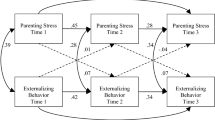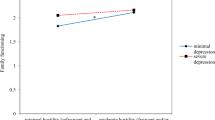Abstract
Sixty-nine families (father, mother, and one child) in which the father had hemophilia, approximately half of whom were HIV positive, were assessed in an examination of the relationship between parental chronic illness, family functioning, child coping strategies, and child adjustment. Latent variable path analyses with partial least-squares estimation procedures (PLS) were used to test a model of the relationship between parental chronic illness, family process variables, child coping strategies, and child internalizing behavior problems. The severity of the father's illness predicted family process variables, which predicted the coping style of the child. The use of more avoidant coping strategies was associated with more internalizing problems.
Similar content being viewed by others
REFERENCES
Achenbach, T. M. (1991). Manual for the Child Behavior Checklist 4–18 and 1991 Profile. Burlington: University of Vermont, Department of Psychiatry.
Armistead, L., & Forehand, R. (1995) For whom the bell tolls: Parenting decisions and challenges faced by mothers who are HIV seropositive. Clinical Psychology: Science and Practice, 2, 239–250.
Armistead, L., Klein, K., & Forehand, R. (1995). Parent physical illness and child functioning. Clinical Psychology Review, 15, 409–422.
Armistead, L., McCombs, A., Forehand, R., Weirson, M., Long, N., & Fauber, R. (1990). Coping with divorce: A study of young adolescents. Journal of Clinical Child Psychology, 19, 79–84.
Bergner, M. (1984). The Sickness Impact Profile (SIP). In N. K. Wenger, M. E. Mattson, C. D. Furberg, & J. Elinson (Eds.), Assessment of quality of life in clinical trials of cardiovascular therapies (pp. 152–159). New York: Le Jacq.
Bergner, M., & Gilson, B. S. (1981). The Sickness Impact Profile: Development and final revision of a health status measure. Medical Care, 14, 57–67.
Bergner, M., & Rothman, M. L. (1987). Health status measures: An overview guide for selection. Annual Review of Public Health, 8, 191–210.
Billings, A. G., & Moos, R. H. (1981). The role of coping responses and social resources in attenuating the stress of life events. Journal of Behavioral Medicine, 4, 139–157.
Causey, D. L., & Dubow, E. F. (1992). Development of a self-report coping measure for elementary school children. Journal of Clinical Child Psychology, 21, 47–59.
Compas, B. E., Worsham, N. L., Epping, J. E., Grant, K. E., Mireault, G., Howell, D. C., & Malcarne, V. L. (1994). When mom or dad has cancer: Markers of psychological distress in cancer patients, spouses and children. Health Psychology, 13, 507–515.
Cummings, E. M., & Davies, P. T. (1994). Maternal depression and child development. Journal of Child Psychology and Psychiatry, 35, 73–112.
Derogatis, L. R., Rickels, K., & Rock, A. F. (1976). The SCL-90 and the MMPI: A step in the validation of a new self-report scale. British Journal of Psychiatry, 128, 280–289.
Derogatis, L. R., & Spencer, P. M. (1982). The Brief Symptom Inventory administration, scoring, and procedures manual Baltimore: John Hopkins. Available from John Hopkins University School of Medicine, Baltimore, MD.
Emery, R.E. (1982). Interparental conflict and the children of discord and divorce. Psychological Bulletin, 92, 310–330.
Emery, R. E., & Forehand, R. (1994). Parental divorce and children's well being: A focus on resilience. In R. J. Haggerty, N. Garmezy, M. Rutter, & L. Sherrod (Eds.), Risk and resilience in children (pp. 64–99). London: Cambridge University Press.
Falk, R. F. (1987). A primer for soft-modeling. Berkeley: University of California Press.
Falk, R. F., & Miller, N.B. (1992). A primer for soft modeling. Akron, OH: The University of Akron.
Forehand, R., Armistead, L., Weirson, M., Brody, G. H., Neighbors, B., Hannan, and The Hemophilia PAC Project (1997). Hemophilia and HIV in married men: An examination of the relationship between illness indicators and functioning of multiple family members. American Journal of Orthopsychiatry, in press.
Forehand, R., McCombs, A., & Brody, G. (1987). The relationship between parental depressive mood states and child functioning. Advances in Behaviour Therapy and Research, 9, 1–20.
Hardy, D. F., Power, T. G., & Jaedicke, S. (1993). Examining the relationship of parenting to children's coping with everyday stress. Child Development, 64, 1829–1841.
Holahan, C. J., & Moos, R. H. (1987). Risk, resistance, and psychological distress: A longitudinal analysis with adults and children. Journal of Abnormal Psychology, 96, 3–13.
Jöreskog, K. G., & Sörbom, D. (1989). LISREL VII: User's reference guide (1st ed.). Mooresville, IN: Scientific Software.
Kazdin, A. E. (1981). Assessment techniques for childhood depression: A critical appraisal. Journal of the American Academy of Child Psychiatry, 20, 358–375.
Kovacs, M. (1981). Rating scales to assess depression in school aged children. Acta Paedopsychiatrica, 46, 305–315.
Lazarus, R. S. & Folkman, S. (1984). Stress, appraisal, and coping. New York: Springer.
Lewis, M. L., Hammond, M. A., & Woods, N. F. (1993). The family's functioning with newly diagnosed breast cancer in the mother: The development of an exploratory model. Journal of Behavioral Medicine, 16, 351–370.
Luther, S. S., & Zigler, E. (1991). Vulnerability and competence: A review of research on resilience in childhood. American Journal of Orthopsychiatry, 61, 6–22
National Center for Health Statistics. (1994). Health, United States, 1993 (Table 31). Hyattsville, MD: Public Health Service.
Porter, B., & O'Leary, K. D. (1980). Marital discord and childhood behavior problems. Journal of Abnormal Child Psychology, 8, 287–295.
Prinz, R. J., Foster, S., Kent, R. N., & O'Leary, H. D. (1979). Multivariate assessment of conflict in depressed and nondepressed mother-adolescent dyads. Journal of Applied Behavior Analysis, 12, 691–700.
Robin, A. L., & Foster, S. (1989). Negotiating parent-adolescent conflict. New York: Guilford Press.
Wold, H. (1980). Soft modeling: Intermediate between traditional model building and data analysis. Mathematical Statistics, 6, 333–346.
Author information
Authors and Affiliations
Rights and permissions
About this article
Cite this article
Steele, R.G., Forehand, R. & Armistead, L. The Role of Family Processes and Coping Strategies in the Relationship Between Parental Chronic Illness and Childhood Internalizing Problems. J Abnorm Child Psychol 25, 83–94 (1997). https://doi.org/10.1023/A:1025771210350
Issue Date:
DOI: https://doi.org/10.1023/A:1025771210350




